河南省洛阳市2014-2015学年高二下学期期末考试英语试题 扫描版含答案
河南省洛阳市2013-2014学年高二下学期期中考试试题 英语 含答案
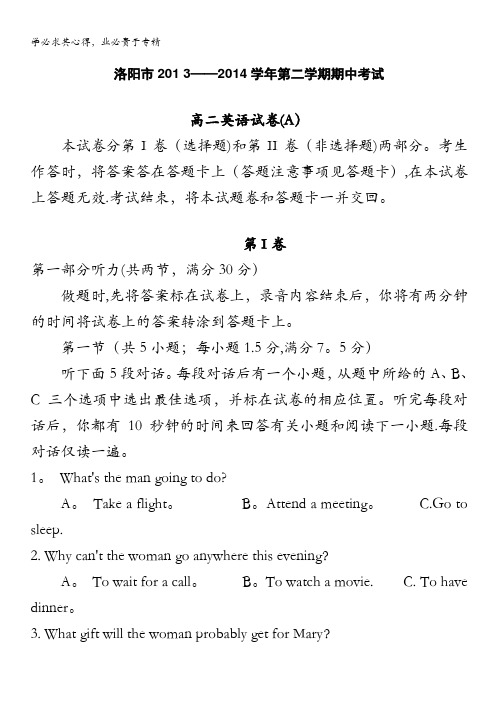
洛阳市201 3——2014学年第二学期期中考试高二英语试卷(A)本试卷分第I卷(选择题)和第II卷(非选择题)两部分。
考生作答时,将答案答在答题卡上(答题注意事项见答题卡),在本试卷上答题无效.考试结束,将本试题卷和答题卡一并交回。
第I卷第一部分听力(共两节,满分30分)做题时,先将答案标在试卷上,录音内容结束后,你将有两分钟的时间将试卷上的答案转涂到答题卡上。
第一节(共5小题;每小题1.5分,满分7。
5分)听下面5段对话。
每段对话后有一个小题,从题中所给的A、B、C三个选项中选出最佳选项,并标在试卷的相应位置。
听完每段对话后,你都有10秒钟的时间来回答有关小题和阅读下一小题.每段对话仅读一遍。
1。
What's the man going to do?A。
Take a flight。
B。
Attend a meeting。
C.Go to sleep.2. Why can't the woman go anywhere this evening?A。
To wait for a call。
B。
To watch a movie. C. To have dinner。
3. What gift will the woman probably get for Mary?A。
A school bag. B。
A film。
C。
A record. 4。
How often does the man do exercise?A。
Every day。
B。
Once a week. C。
Twicea week.5. What did the woman like doing when she was young?A。
Reading in the library. B。
Making friends。
C。
Riding in the country.第二节(共15小题;每小题1。
5分,满分22.5分)听下面5段对话或独白。
高三英语月考试题及答案-洛阳市2014--2015学年高三年级统一考试
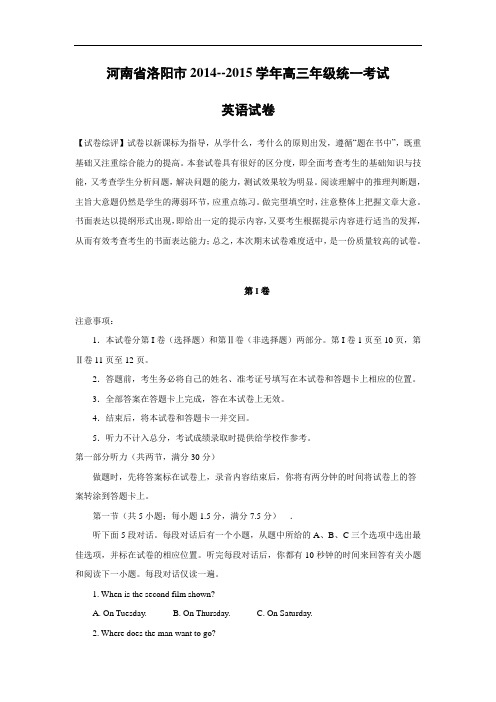
河南省洛阳市2014--2015学年高三年级统一考试英语试卷【试卷综评】试卷以新课标为指导,从学什么,考什么的原则出发,遵循“题在书中”,既重基础又注重综合能力的提高。
本套试卷具有很好的区分度,即全面考查考生的基础知识与技能,又考查学生分析问题,解决问题的能力,测试效果较为明显。
阅读理解中的推理判断题,主旨大意题仍然是学生的薄弱环节,应重点练习。
做完型填空时,注意整体上把握文章大意。
书面表达以提纲形式出现,即给出一定的提示内容,又要考生根据提示内容进行适当的发挥,从而有效考查考生的书面表达能力;总之,本次期末试卷难度适中,是一份质量较高的试卷。
第I卷注意事项:1.本试卷分第I卷(选择题)和第Ⅱ卷(非选择题)两部分。
第I卷1页至10页,第Ⅱ卷11页至12页。
2.答题前,考生务必将自己的姓名、准考证号填写在本试卷和答题卡上相应的位置。
3.全部答案在答题卡上完成,答在本试卷上无效。
4.结束后,将本试卷和答题卡一并交回。
5.听力不计入总分,考试成绩录取时提供给学校作参考。
第一部分听力(共两节,满分30分)做题时,先将答案标在试卷上,录音内容结束后,你将有两分钟的时间将试卷上的答案转涂到答题卡上。
第一节(共5小题;每小题1.5分,满分7.5分).听下面5段对话。
每段对话后有一个小题,从题中所给的A、B、C三个选项中选出最佳选项,并标在试卷的相应位置。
听完每段对话后,你都有10秒钟的时间来回答有关小题和阅读下一小题。
每段对话仅读一遍。
1. When is the second film shown?A. On Tuesday.B. On Thursday.C. On Saturday.2. Where does the man want to go?A. To a bookstore.B. To a shoes shopC. To a shoemaker's.3. How old was the man when he wrote his first novel?A.18.B.19.C.20.4. What does the woman advise the man to do?A. Smoke less.B. See a doctor.C. Stop smoking.5. Where are the speakers?A. At a restaurant.B. At a cinema.C. At the station.第二节(共15小题;每小题1.5分,满分22.5分)听下面5段对话或独白。
河南省南阳市2014-2015学年高二上期期末质量评估英语试题 扫描版含答案
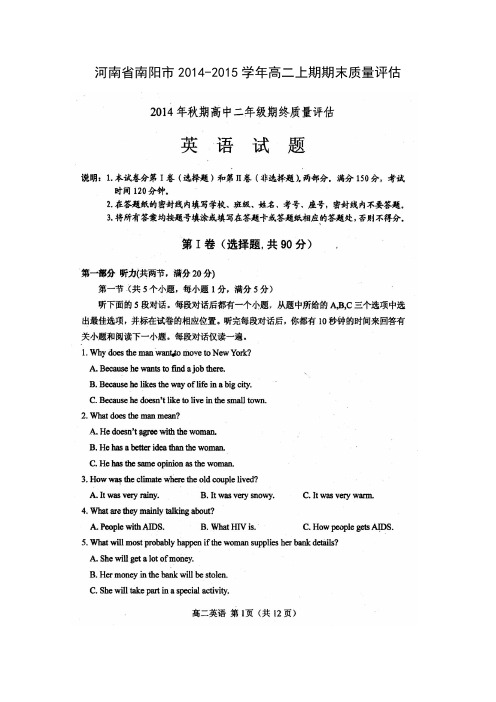
河南省南阳市2014-2015学年高二上期期末质量评估2014年秋期高中二年级期终质量评估英语试题参考答案【听力】(每小题1分,满分20分)1-10 ACBCB BBCAB 11-20ACABC CAACB【阅读理解】(每小题2分,满分40分)21-24 ABCA 25-28 BDAD 29-32 ABCC 33-35 CDA 36-40 BGDCE【完形填空】(每小题1.5分,满分30分)41-50 BDCAC BDCDB 51-60 CDAAD BCAAD【语法填空】(每小题1.5分,满分15分)61.for 62.will give 63.congratulations 64.working 65.while/when66.With 67.In 68.efficiently 69.to hire 70.applicants完成句子(每小题1分,满分10分)71.independently/on his own 72.has committed 73.Put 74.(should) be taken 75.surrounding 76.equally 77.(to be) beneficial; of benefit78.effect/influence/impact 79.anxiety 80.extremely短文改错(每改对一处1分,共10处错误10分)1.best前加the2.Personal--Personally3.lesson--lessons4.paid--paying或之前加anded前were去掉6.them--it7.but--and8.can--could te--later 10.it去掉书面表达参考答案(满分25分)Dear Sir,I’m LiHua, a senior two student from Guangming Middle School. I’m eager to join your English club this winter vacation. Now I’m writing for further information.First, I’d like to know when the activities will be held so that I can make daily plans. Second, I’m interested in who will join the club. As you know, it is better to communicate with native speakers. Furthermore, as a middle school student, need I pay? If so, how much is the fee?Believe it or not, I am an English lover. In my opinion, it is necessary for us to have a good master of the language. As the most widely used language in the world, English is playing a more and more important role in international communication as well as daily life. Unfortunately, we Chinese students have few chances to practise it, especially spoken English. Therefore I want to get it improved in this precious winter holiday. Meanwhile I’d like to make more friends from different backgrounds in your club.I’d appreciate it if you could reply to me soon.Yours truly,LiHua。
河南省洛阳高中2014-2015学年高一上学期英语入学测试题 Word版含答案
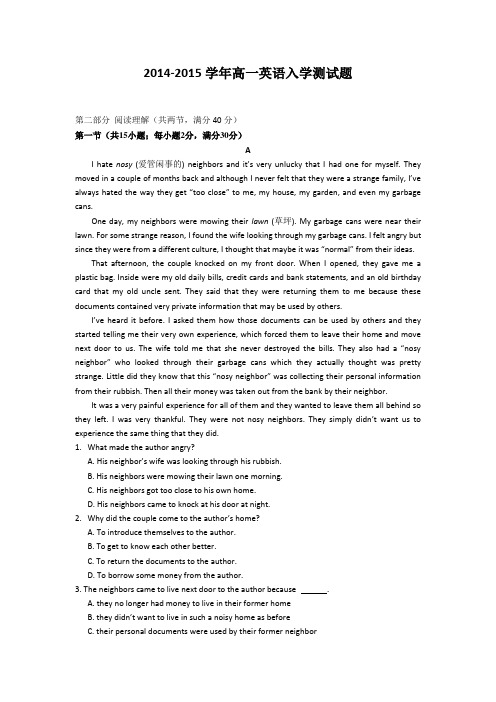
2014-2015学年高一英语入学测试题第二部分阅读理解(共两节,满分40分)第一节(共15小题;每小题2分,满分30分)AI hate nosy(爱管闲事的) neighbors and it’s very unlucky that I had one for myself. They moved in a couple of months back and although I never felt that they were a strange family, I’ve alwa ys hated the way they get “too close” to me, my house, my garden, and even my garbage cans.One day, my neighbors were mowing their lawn (草坪). My garbage cans were near their lawn. For some strange reason, I found the wife looking through my garbage cans. I felt angry but since they were from a different culture, I thought that maybe it was “normal” from their ideas.That afternoon, the couple knocked on my front door. When I opened, they gave me a plastic bag. Inside were my old daily bills, credit cards and bank statements, and an old birthday card that my old uncle sent. They said that they were returning them to me because these documents contained very private information that may be used by others.I’ve heard it before. I asked them how those documents can be used by others and they started telling me their very own experience, which forced them to leave their home and move next door to us. The wife told me that she never destroyed the bills. They also had a “nosy neighbor” who looked through their garb age cans which they actually thought was pretty strange. Little did they know that this “nosy neighbor” was collecting their personal information from their rubbish. Then all their money was taken out from the bank by their neighbor.It was a very painful experience for all of them and they wanted to leave them all behind so they left. I was very thankful. They were not nosy neighbors. They simply didn’t want us to experience the same thing that they did.1. What made the author angry?A. His neighbor’s w ife was looking through his rubbish.B. His neighbors were mowing their lawn one morning.C. His neighbors got too close to his own home.D. His neighbors came to knock at his door at night.2. Why did the couple come to the author’s home?A. To introduce themselves to the author.B. To get to know each other better.C. To return the documents to the author.D. To borrow some money from the author.3. The neighbors came to live next door to the author because .A. they no longer had money to live in their former homeB. they didn’t want to live in such a noisy home as beforeC. their personal documents were used by their former neighborD. they thought the author was much better than their former neighbor4. Which of the following can we infer from the last paragraph?A. The author was kind and helpful to the neighbors.B. The neighbors had to move from place to place.C. The neighbors didn’t have enough money.D. The author changed his idea about his neighbors.BPeople have always been wondering about what our future will look like. Go on reading this text, and you will know what will happen in the next fifty years.How can we know what the future will look like? To be able to understand the future, you must know the past. What has taken us to where we are today and what has changed along the way? The world has changed a lot in the last 150 years, but we humans are driven by the same basic needs as we were 150 years ago. Will this change in the next 150 years? No.What inventions have really made a difference in the last 150 years? In the past years, the inventions that have affected most people around the world for everyday living are the telephone, electricity, radio, television, computer, the car and the ability to communicate through the Internet. Then we of course have a lot of inventions that have made life easier, like new medicine, faster transports etc. In general, human beings have been working hard in the last 150 years to make the inventions so that they will be able to get control of the time and the world. Since there is still much to do in this area, this will be the focus at least for the next 150 years.Why do we need to predict the future? Predicting the future is important for two reasons: first we need to start to think about what kind of future we would like for ourselves and to pass on to the next generation, and then we need to know what decisions we need to make today that will give the best result in the future.5. What does the author try to tell us in the second paragraph?A. Our basic needs will not change in the future.B. The world is quite different from what it was.C. Humans will no longer enjoy food in the future.D. The world will be completely changed tomorrow.6. Our past inventions have made .A. our daily life more stressfulB. it easy for us to liveC. our work easily doneD. us work less time7. What will humans do in order to keep the world under control?A. To produce more cars for transportation.B. To spend more time working on the Internet.C. To work much harder to achieve their goals.D. To focus on making more inventions.8. What is the main idea of the last paragraph?A. What result we’ll receive in the future.B. The two reasons of predicting the future.C. The importance of predicting the future.D. The decisions we make for our future.CPasta is the world’s favorite food. A survey taken in 17 countries confirmed that pasta is what people like to eat most. Not only is pasta the number one food in its home country — Italy, but is also enjoyed in faraway places like the Philippines, Mexico and South Africa.Pasta has become popular, for one thing, because it is cheap and easy to prepare. Just cook noodles or other f orms of pasta, make a sauce to go with it and you’re finished. Many different types of meals can be created with pasta. It tastes good and fills your stomach. It produces energy in the form of carbohydrates(碳水化合物), which is why athletes eat pasta regularly. Pasta can also be kept for a longer time. You don’t have to use it up at once.Pasta has also become popular because it stands for the Italian way of life. People all over the world like it because it’s so simple. It has two basic ingredients (成分), wheat and water, just like bread.Legend has it that Marco Polo brought pasta back to Italy with him but this is not true. Arabs probably brought a noodle-like dish to Sicily in the 8th century. Farmers have been growing wheat, the main ingredient of pasta, there for ages.The worldwide sales of pasta have risen sharply over the past decade. Italy leads the pasta-eating community of the world. The Italians are the number one consumers followed by Venezuela and Tunisia.9. In which country do people eat pasta most?A. Mexico.B. Venezuela.C. The Philippines.D. South Africa.10. Sports people often have pasta because .A. it costs less moneyB. it can be kept longerC. it provides proper energyD. it contains no carbohydrates11. One reason why pasta is favored is that .A. it is rich in nutritionB. it smells just like breadC. people like a simple lifestyleD. Italian food stands for fashion12. What would be the best title for the text?A. The origin of pastaB. Italians’ love for past aC. Pasta —the world’s favorite foodD. Pasta is changing people’s way of lifeDGold has exercised power for ages. People have been looking for gold since the beginning of mankind. Whole empires (帝国) have been built on gold. The Spanish conquered all of Central and South America in order to bring gold back to their home country. Inca and Maya civilizations worshipped gold and thought it came from the sun. Explorers traveled for thousands of miles in search of the precious metal.Gold is, once again, in demand. People want to have gold as a kind of security in unstable times. They invest in (投资于) gold instead of saving their money in banks. Many people argue that since 9/11 the world has become a more dangerous place. When in 2008 the financialmarkets collapsed (崩溃), the major currencies of the world became weaker. Investors were no longer sure how safe their money was. They bought more and more gold which made the price of the yellow metal rise.One of the reasons why gold is so valuable is that it practically cannot be destroyed. It always stays the same and never changes. It can be recycled and afterwards be used for many things. In Iraq poor people collect gold dust and bring it back to jewellery shops to be recycled. Recycling gold is also a big business in Japan, where gold is collected from old mobile phones and other industrial waste.The demand for the metal and increased production leads to a number of environmental problems. A single ounce of gold produces over 30 tons of waste, more than any other metal on earth. Poisonous substances can leak into rivers and contaminate (污染) the water. In Peru and Brazil wide areas of the Amazon rainforest are cut down by the illegal mining of gold.13. Spain made war on Central America .A. to expand the empireB. to defend their beliefsC. to get a precious metalD. to enslave people there14. Investors are more fond of gold because .A. its price has never gone downB. its production is becoming lessC. it can ensure the value for longD. it is the best material for jewelries15. It can be inferred from the text that .A. gold has very stable (稳定的) physical characterB. collecting gold dust is a career in JapanC. around 30 tons of gold is made each yearD. new-style mobile phones begin to use gold第二节(共5小题; 每小题2分, 满分10分)根据短文内容,从短文后的选项中选出能填入空白处的最佳选项。
14—15学年下学期高二期末考试英语试题(附答案)(6)
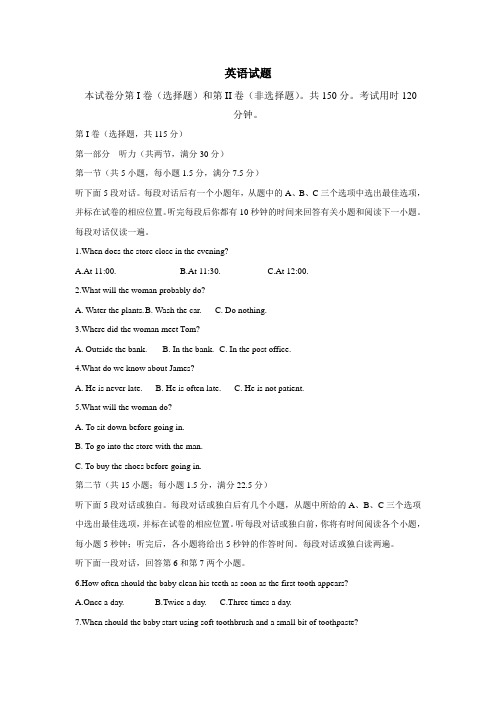
英语试题本试卷分第I卷(选择题)和第II卷(非选择题)。
共150分。
考试用时120分钟。
第I卷(选择题,共115分)第一部分听力(共两节,满分30分)第一节(共5小题,每小题1.5分,满分7.5分)听下面5段对话。
每段对话后有一个小题年,从题中的A、B、C三个选项中选出最佳选项,并标在试卷的相应位置。
听完每段后你都有10秒钟的时间来回答有关小题和阅读下一小题。
每段对话仅读一遍。
1.When does the store close in the evening?A.At 11:00.B.At 11:30.C.At 12:00.2.What will the woman probably do?A. Water the plants.B. Wash the car.C. Do nothing.3.Where did the woman meet Tom?A. Outside the bank.B. In the bank.C. In the post office.4.What do we know about James?A. He is never late.B. He is often late.C. He is not patient.5.What will the woman do?A. To sit down before going in.B. To go into the store with the man.C. To buy the shoes before going in.第二节(共15小题;每小题1.5分,满分22.5分)听下面5段对话或独白。
每段对话或独白后有几个小题,从题中所给的A、B、C三个选项中选出最佳选项,并标在试卷的相应位置。
听每段对话或独白前,你将有时间阅读各个小题,每小题5秒钟;听完后,各小题将给出5秒钟的作答时间。
每段对话或独白读两遍。
听下面一段对话,回答第6和第7两个小题。
2014-2015学年第二学期期末考试高二英语试题模拟卷含答案
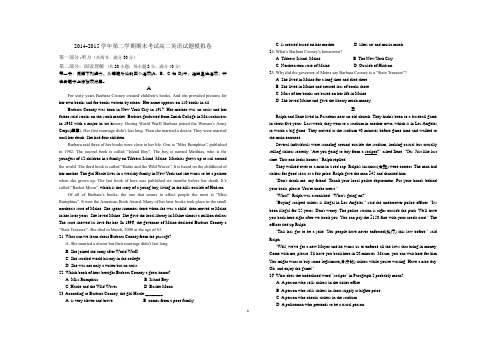
2014-2015学年第二学期期末考试高二英语试题模拟卷第一部分:听力(共两节,满分30分)第二部分:阅读理解(共20小题;每小题2分,满分40分)第一节:阅读下列短文,从每题所给的四个选项(A、B、C和D)中,选出最佳选项,并在答题卡上将该项涂黑。
AFor sixty years Barbara Cooney created children’s books. And she provided pictures for her own books and for books written by others. Her name appears on 110 books in all.Barbara Cooney was born in New York City in 1917. Her mother was an artist and her father sold stocks on the stock market. Barbara graduated from Smith College in Massachusetts in 1938 with a major in art h istory. During World WarII Barbara joined the Women’s Army Corps(军团). Her first marriage didn’t last long. Then she married a doctor. They were married until her death. She had four children.Barbara said three of her books were close to her life. One is “Miss Rumphius”, published in 1982. The second book is called “Island Boy”. The boy is named Matthias, who is the youngest of 12 children in a family on Tibbetts Island, Maine. Matthias grows up to sail around the world. The third book is called “Hattie and the Wild Waves”. It is based on the childhood of her mother. The girl Hattie lives in a wealthy family in New York and she wants to be a painter when she grows up. The last book of hers was published six months before her death. It’s called “Basket Moon”, which is the story of a young boy, living in the hills outside of Hudson.Of all of Barbara’s books, the one that seems to affect people the most is “Miss Rumphius”. It won the American Book Award. Many of her later books took place in the small northeast state of Maine. She spent summers there when she was a child, then moved to Maine in her later years. She loved Maine. She gave the local library in Maine almost a million dollars. The state showed its love for her. In 1996, the governor of Maine declared Barbara Cooney a “State Treasure”. She died in March, 2000 at the age of 83.21. What can we learn about Barbara Cooney from the passage?A. She married a doctor but their marriage didn’t last long.B. She joined the army after World WarII.C. She studied world history in the college.D. She was not only a writer but an artist.22. Which book of hers brought Barbara Cooney a great honor?A. Miss RumphiusB. Island BoyC. Hattie and the Wild WavesD. Basket Moon23. According to Barbara Cooney, the girl Hattie ________.A. is very clever and braveB. comes from a poor familyC. is created based on her motherD. likes art and music much24. What’s Barbara Cooney’s hometown?A. Tibbetts Island, MaineB. The New York CityC. Northeastern state of MaineD. Outside of Hudson25. Why did the governor of Maine say Barbara Cooney is a “State Treasure”?A. She lived in Maine for a long time and died there.B. She lived in Maine and created lots of books there.C. Most of her books are based on her life in Maine.D. She loved Maine and gave the library much money.BRalph and Ilene lived in Pasadena near an old church. They hadn't been to a baseball game in about five years. Last week, they went to a stadium in another town, which is in Los Angeles,to watch a big game. They arrived at the stadium 40 minutes before game time and walked tothe main entrance.Several individuals were standing around outside the stadium, looking casual but actually selling tickets secretly. "Are you going to buy from a scalper?" asked Ilene. "Yes. Just like lasttime. That one looks honest," Ralph replied.They walked over to a man in a red cap. Ralph's instincts(本能) were correct. The man had tickets for good seats at a fair price. Ralph gave the man $45 and thanked him."Don't thank me, my friend. Thank your local police department. Put your hands behind your back, please. You're under arrest.""What?" Ralph was astonished. "What's going on?""Buying scalped tickets is illegal in Los Angeles," said the undercover police officer. "It's been illegal for 25 years. Don't worry. The police station is right outside the park. We'll haveyou back here right after we book you. You can pay the $150 fine with your credit card." Theofficer tied up Ralph."This has got to be a joke. You people have never enforced(执行) this law before." said Ralph."Well, we've got a new Mayor and he wants us to enforce all the laws that bring in money.Come with me, please. I'll have you back here in 20 minutes. Ma'am, you can wait here for him.You might want to buy some legitimate(合法的) tickets while you're waiting. Have a nice day.Oh, and enjoy the game!"26. What does the underlined word "scalper" in Paragraph 2 probably mean?A. A person who sells tickets in the ticket office.B. A person who sells tickets in short supply at higher price.C. A person who checks tickets in the stadium.D. A policeman who pretends to be a usual person.127. Why was Ralph arrested by the policeman?A. He paid too little.B. He should pay the police $ 150.C. He bought tickets from a scalper.D. He went to the wrong entrance.28. What do you think of the new mayor?A. Strict.B. Fair.C. Cold-blooded.D. Greedy.29. Which of the following statements is NOT true according to the passage?A. Ralph would be put into prison and he had to pay $150.B. The scalper with a red cap is a policeman in fact.C. Ilene was not arrested.D. The law had not been enforced very well for the past 25 years.30. What can we know from the passage?A. Ralph and Ilene finally watched the baseball game.B. Ralph had once bought tickets from a scalper before.C. Buying scalped tickets was legal in Los Angeles before.D. Ilene will also be fined $150.CWearing ties was originally the mark of Britain’s most powerful classes, which made the tie itself a symbol of power and respect. And that led it to be adopted by a much larger group-the business group.You cannot wear a tie if you work with machinery. So wearing a tie became a sign that you were a man who used your brain to make a living, rather than your hands. It showed you were serious. It showed you were a professional. It meant that everyone who wanted a job in business had to wear one. It was just impossible to take seriously a man who didn’t wear a piece of colored silk around his neck.This is how millions of people came to be wearing ties across the world. They are part of the uniform (制服) of business.Is there a future for ties? The signs are not promising. Many political leaders, including former British Prime Minister Tony Blair, now go without ties.It was common for men across the western world to wear hats as part of their business uniform up until around 1960. That changed with the election of John F. Kennedy to the president of the United States. Kennedy never wore a hat-in fact his nickname was “hatless Jack”. Seeing that the most powerful man in the world did not have to wear a hat, millions of other men decided that they did not have to, either. Hats simply disappeared across the Western world. Perhaps “tieless Tony” (former UK Prime Minister Tony Blair) will have the same effect as “hatless Jack”31. In Britain, ties were first used as a sign to show a person’s ________.A. personalityB. social positionC. wearing styleD. favorite hobby32. Nowadays, ties are ________.A. the symbol that your work is importantB. a sign that you make a living by your handsC. a decoration to show you are seriousD. part of uniform of business33. What opinion may the writer hold?A. Blair is the best leader in the world.B. Kennedy is the best leader in the world.C. millions of people will go to work without a tie.D. people will wear hats instead of ties.34. Which of the following statements is TRUE according to the passage?A. If you are a professional, you can’t wear a tie in Britain.B. The tie will become more fashionable and popular in the future.C. John F. Kennedy changed the fact that wearing hats as part of their business uniform.D. Men didn’t wear hats as part of their business uniform until around 1960.35. What can we know from the last paragraph?A. Wearing ties remains very popular with powerful men in the world.B. It is possible that wearing ties will not be fashionable in the future.C. Men in the western world will still wear hats and ties.D. It will be inconvenient for people to wear ties and hats at work.第二节:七选五(根据短文内容,从短文后的选项中选出能填入空白处的最佳选项。
2014-2015学年度高二期末英语试题(含解析)
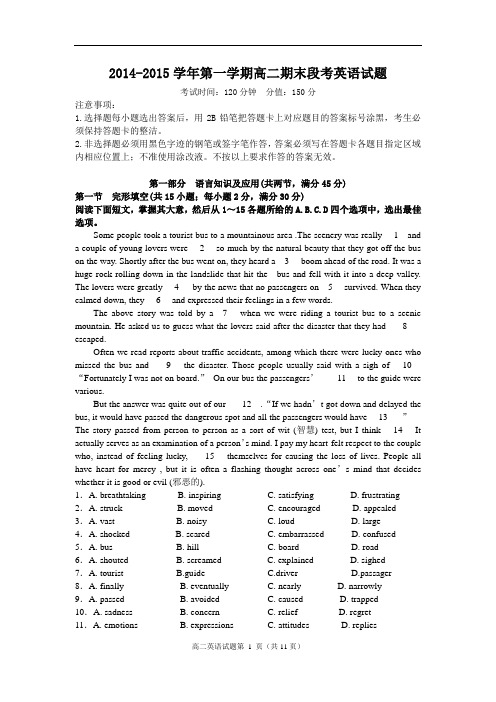
2014-2015学年第一学期高二期末段考英语试题考试时间:120分钟分值:150分注意事项:1.选择题每小题选出答案后,用2B铅笔把答题卡上对应题目的答案标号涂黑,考生必须保持答题卡的整洁。
2.非选择题必须用黑色字迹的钢笔或签字笔作答,答案必须写在答题卡各题目指定区域内相应位置上;不准使用涂改液。
不按以上要求作答的答案无效。
第一部分语言知识及应用(共两节,满分45分)第一节完形填空(共15小题;每小题2分,满分30分)阅读下面短文,掌握其大意,然后从1~15各题所给的A.B.C.D四个选项中,选出最佳选项。
Some people took a tourist bus to a mountainous area .The scenery was really __1__and a couple of young lovers were __2__ so much by the natural beauty that they got off the bus on the way. Shortly after the bus went on, they heard a__3__ boom ahead of the road. It was a huge rock rolling down in the landslide that hit the bus and fell with it into a deep valley. The lovers were greatly __4___by the news that no passengers on__5__ survived. When they calmed down, they __6__ and expressed their feelings in a few words.The above story was told by a__7__ when we were riding a tourist bus to a scenic mountain. He asked us to guess what the lovers said after the disaster that they had ___8___ escaped.Often we read reports about traffic accidents, among which there were lucky ones who missed the bus and ___9__ the disaster. Those people usually said with a sigh of __10__ “Fortunately I was not on board.”On our bus the passengers’___11__ to the guide were various.But the answer was quite out of our ___12__.“If we hadn’t got down and delayed the bus, it would have passed the dangerous spot and all the passengers would have __13___”The story passed from person to person as a sort of wit (智慧) test, but I think __14__ It actually serves as an examination of a person’s mind. I pay my heart-felt respect to the couple who, instead of feeling lucky, ___15__ themselves for causing the loss of lives. People all have heart for mercy , but it is often a flashing thought across one’s mind that decides whether it is good or evil (邪恶的).1.A. breathtaking B. inspiring C. satisfying D. frustrating 2.A. struck B. moved C. encouraged D. appealed 3.A. vast B. noisy C. loud D. large4.A. shocked B. scared C. embarrassed D. confused 5.A. bus B. hill C. board D. road6.A. shouted B. screamed C. explained D. sighed7.A. tourist B.guide C.driver D.passager 8.A. finally B. eventually C. nearly D. narrowly9.A. passed B. avoided C. caused D. trapped10.A. sadness B. concern C. relief D. regret11.A. emotions B. expressions C. attitudes D. replies12.A. touch ` B. expectation C. doubt D. reach13.A. died B. passed C. survived D. stayed14.A. differently B. actually C. similarly D. sincerely 15.A. thanked B. blamed C. apologized D. forgave第二节语法填空(共10小题;每小题1.5分,满分15分)阅读下面短文,按照句子结构的语法性和上下文连贯的要求,在空格处填入一个适当的词或使用括号中词语的正确形式填空。
